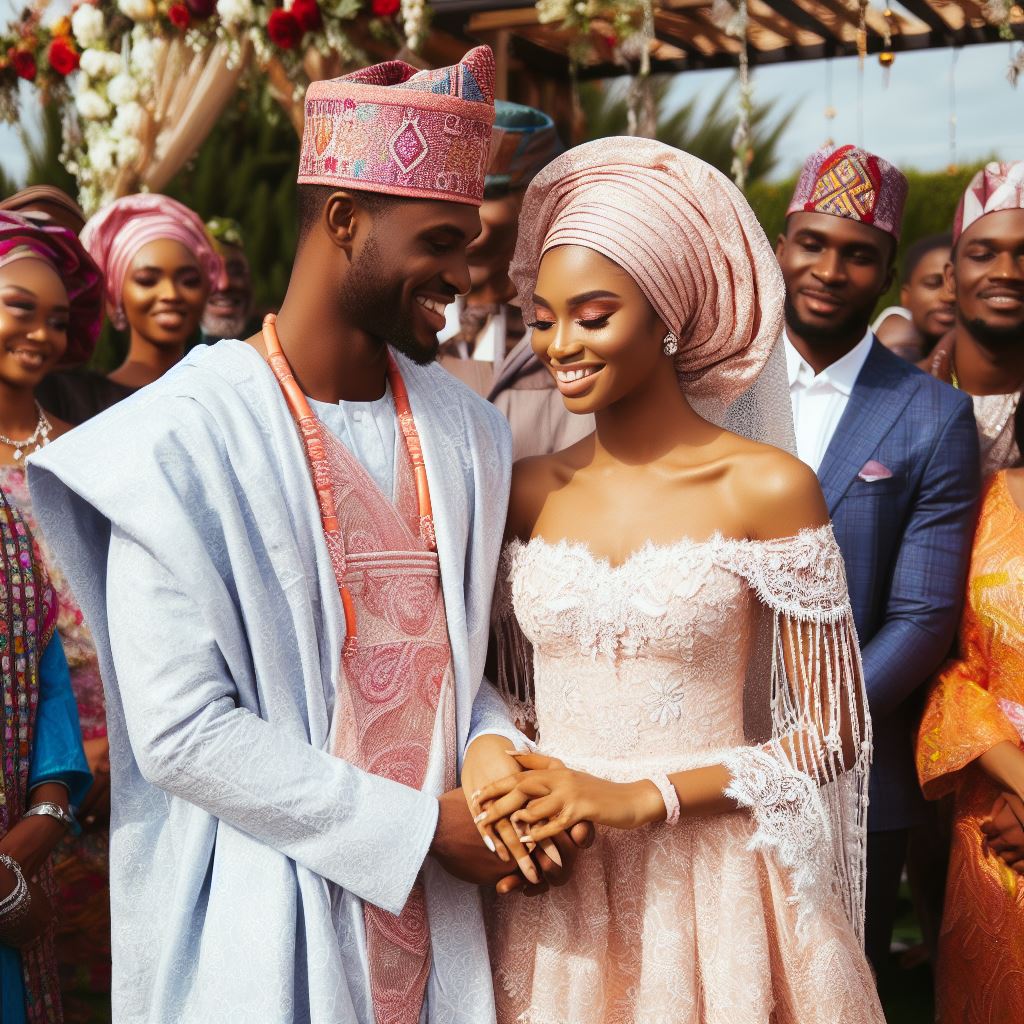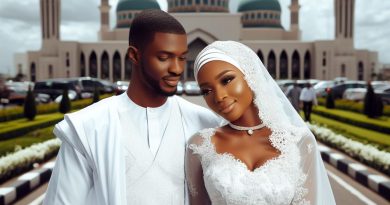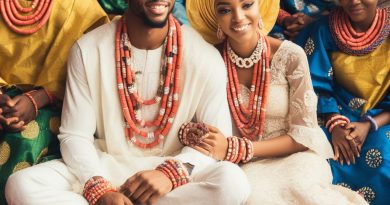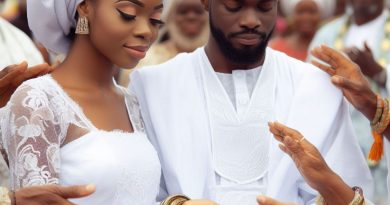The Essence of Marriage in Traditional Nigerian Cultures
Last Updated on January 28, 2024
Introduction
Significance of Marriage in Nigerian Cultures
Within the tapestry of traditional Nigerian cultures, marriage assumes a profound significance that reverberates through generations.
It is not merely a union of two individuals; it is a celebration of heritage, an alliance of families, and a manifestation of shared values.
In this section, we embark on a captivating journey through the multifaceted world of traditional Nigerian marriage.
We will explore how it transcends the personal realm to influence the broader social, economic, and cultural landscape.
From elaborate ceremonies that bridge communities to the role of dowries in shaping financial security, marriage is far more than a life event.
It’s a societal cornerstone that weaves the intricate fabric of Nigerian traditions.
Join us as we delve deeper into the heart of these vibrant cultures, unveiling the rich tapestry of customs, rituals, and beliefs that underscore the essence of marriage.
Discover how it’s more than a union; it’s a living legacy that binds generations, fosters unity, and sustains the invaluable heritage of Nigeria.
The Purpose of Marriage
Preservation of family legacy and lineage
Marriage preserves family legacies and lineages in traditional Nigerian cultures by marrying within tribes or clans, upholding customs and traditions passed through generations.
Formation of alliances between families
Marriage is also a means of forming alliances between families. Through marriage, families come together and create bonds of trust, support, and cooperation.
This can lead to stronger networks within communities, as interconnected families share resources, knowledge, and opportunities.
Furthermore, these alliances can also serve as a form of security and protection.
In traditional Nigerian societies, marrying into a respected or influential family can offer social and economic advantages, ensuring the well-being and prosperity of the couple and their future children.
Procreation and continuation of the community
Perhaps one of the most significant purposes of marriage in traditional Nigerian cultures is procreation and the continuation of the community.
Families highly value children, viewing them as blessings and future carriers of the family name, practices, and beliefs.
Additionally, the birth of children ensures the growth and perpetuation of the community.
In traditional Nigerian cultures, the more children a couple has, the more esteemed they are within their community. Larger families are often associated with prosperity, power, and social status.
Moreover, the role of marriage goes beyond procreation itself. It provides a stable and nurturing environment for the upbringing of children.
The couple, along with their extended family, takes on the responsibility of raising and guiding the next generation, instilling cultural values, and preparing them to become productive members of society.
Read: Couples of the Bible: Stories and Marriage Verses
Traditional Nigerian Marriage Customs
Marriage ceremonies and rituals
In traditional Nigerian cultures, marriage is considered a sacred institution and a vital aspect of community life.
The essence of marriage goes beyond the union of two individuals; it encompasses the joining of families, the preservation of cultural heritage, and the strengthening of .
Marriage ceremonies and rituals play a significant role in traditional Nigerian weddings. The festivities often begin with the introduction of the families involved.
This serves as an opportunity for both families to formally meet and establish a connection. It is a moment of celebration and unity.
During the marriage ceremonies, there is a tradition of exchanging gifts and negotiating a dowry.
This practice highlights the importance of reciprocity and symbolizes the willingness of the groom’s family to embrace their new daughter-in-law.
The exchange of gifts also strengthens the bond between the two families.
Traditional attire and cultural symbols are essential elements in Nigerian weddings. The couple and their families adorn themselves in vibrant, traditional clothing that represents their cultural heritage.
These attires serve as a visual display of pride and identity, honoring the traditions that have been passed down through generations.
No Nigerian wedding is complete without the performance of traditional dances and music.
These dances reflect the joy and excitement of the occasion. They bring people together as they celebrate the union of two individuals and the merging of their families.
Marriage arrangements
Marriage arrangements in traditional Nigerian cultures involve the active participation of parents and elders.
They play a crucial role in selecting suitable partners for their children based on factors such as lineage, character, and family reputation.
Their wisdom and guidance ensure that the marriage will be a harmonious union.
Nigerian marriages deeply embed traditional values and customs, with couples expected to actively uphold them as ancestral legacies.
This adherence to tradition fosters a sense of continuity, stability, and cultural pride within the marriage.
Traditional Nigerian societies actively involve the entire community in the marriage process, emphasizing it as a collective interest beyond the couple and their families.
The community supports and blesses the marriage, providing a strong foundation of support and accountability.
Traditional Nigerian marriage customs are rich in symbolism and cultural significance.
They emphasize the importance of family, community, and the preservation of cultural heritage.
These customs strengthen the bonds between individuals, families, and communities, creating a sense of unity, continuity, and shared identity.
Read: Heartfelt Marriage Prayers and Their Bible Origins
The Roles of Men and Women in Traditional Nigerian Marriages
Traditional gender roles and expectations
In traditional Nigerian cultures, gender roles and expectations play a significant role in shaping marriages.
Men are expected to be providers and protectors of the family, while women are expected to take care of the household and children.
The role of men as providers and protectors
Men in traditional Nigerian marriages are considered as the breadwinners of the family. They are responsible for providing financial support and meeting the material needs of their wives and children.
Additionally, men are expected to protect their families from any harm and act as the authority figure in the household.
The role of women as caretakers and homemakers
Women, on the other hand, are expected to take care of the domestic duties and nurture the family. They are responsible for cooking, cleaning, and raising children.
Women are also expected to be submissive to their husbands and fulfill their needs.
Shifting dynamics in modern Nigerian marriages
Changing social and economic conditions, along with Western ideals and urbanization, have actively challenged traditional gender roles in Nigerian marriages.
These factors have led to shifting dynamics in modern Nigerian marriages.
Changing expectations and gender equality
As Nigerian society becomes more modernized, the expectations placed on men and women in marriages have been evolving.
There is a growing emphasis on gender equality, with women seeking more autonomy and equal participation in decision-making. This has led to a redefinition of gender roles within marriages.
Influence of Western ideals and urbanization
The influx of Western ideas and urbanization has also contributed to the changing dynamics of Nigerian marriages.
Western notions of gender equality and individualism have influenced the expectations and aspirations of Nigerian couples.
Many women now pursue education, careers, and seek a more egalitarian partnership with their spouses.
Traditional Nigerian marriages have historically assigned specific roles and expectations to men and women.
Changing social and economic conditions, Western ideals, and urbanization actively challenge these gender roles in Nigerian society.
Nigerian marriages are now becoming more egalitarian, with women seeking greater autonomy and equal participation in decision-making processes.
Read: From Adam and Eve: Lessons on Marriage in the Bible

Delve into the Subject: Sexual Intimacy Issues and Seeking Help in Nigeria
Uncover the Details: Harmony at Home: Daily Prayers for Peaceful Nigerian Families
The Importance of Marriage in Traditional Nigerian Societies
Social stability and cohesion
In traditional Nigerian cultures, the institution of marriage holds immense significance. It serves as a pillar of social stability and cohesion, promoting strong family bonds and community ties.
The importance of marriage can be understood through its various implications in Nigerian societies.
Firstly, marriage strengthens family bonds and fosters a sense of unity within the community.
By forming marital unions, individuals become part of a larger social network comprising not only their immediate families but also extended family members, neighbors, and friends.
This interconnectedness creates a support system that promotes social stability and cohesiveness.
Furthermore, marriage encourages communal support and unity. When individuals exchange marital vows, they commit to supporting and caring for one another.
This commitment extends beyond the couple and encompasses the entire community.
Nigerian communities rely on this mutual support to overcome challenges, celebrate achievements, and tackle social issues collectively.
Economic implications
Economically, marriage plays a crucial role in resource sharing and responsibility distribution.
When couples join their lives, they pool their resources, both tangible and intangible, to create a stronger foundation for their families.
This sharing of resources ensures efficient use of available assets and reduces the burden on individuals.
Moreover, marriage facilitates wealth accumulation and distribution, contributing to economic stability in Nigerian societies.
Preservation of cultural heritage
Marriage also plays a significant role in preserving cultural heritage. Nigerian cultures are rich and diverse, with unique traditions and customs.
Through marriage, these traditions are passed down from one generation to another, ensuring their continuity.
The marital union becomes a vehicle for transmitting knowledge, rituals, and values, ensuring that future generations understand and respect their cultural roots.
In addition, marriage helps in maintaining cultural identity and values.
As Nigeria undergoes modernization and globalization, the risk of cultural erosion becomes a concern.
However, marriage acts as a focal point for cultural preservation.
Marriage ceremonies, traditional wedding rituals, and marital customs actively protect and uphold Nigerian cultures.
The importance of marriage in traditional Nigerian societies cannot be overstated. It provides social stability and cohesion by strengthening family bonds and fostering community ties.
Additionally, marriage has significant economic implications, enabling resource sharing, responsibility distribution, wealth accumulation, and distribution.
Most importantly, marriage plays a vital role in preserving cultural heritage by passing down traditions and customs to future generations while maintaining cultural identity and values.
Read: Grace, Love, and Unity: Biblical Keys for Marriage
Conclusion
Recap of the significance of marriage in traditional Nigerian cultures
Marriage holds a significant place in the fabric of traditional Nigerian cultures. It serves as not only a union between two individuals but also a joining of families, communities, and ancestral spirits.
Elaborate rituals and traditions make marriage a sacred institution that preserves culture, promotes harmony, and continues lineages.
Moreover, marriage serves as a foundation for procreation, providing stability and support for the upbringing of children, and ensuring the passing down of cultural heritage from one generation to another.
With the advent of modernization and globalization, the essence of marriage in traditional Nigerian cultures has faced some challenges.
However, the enduring importance of marriage remains deeply ingrained in Nigerian society.
Marriage in traditional Nigerian cultures is not just a union between two individuals but a bond that extends beyond the couple to encompass the entire community.
It is a symbol of continuity, love, and unity, and a testament to the rich cultural heritage of Nigeria.


